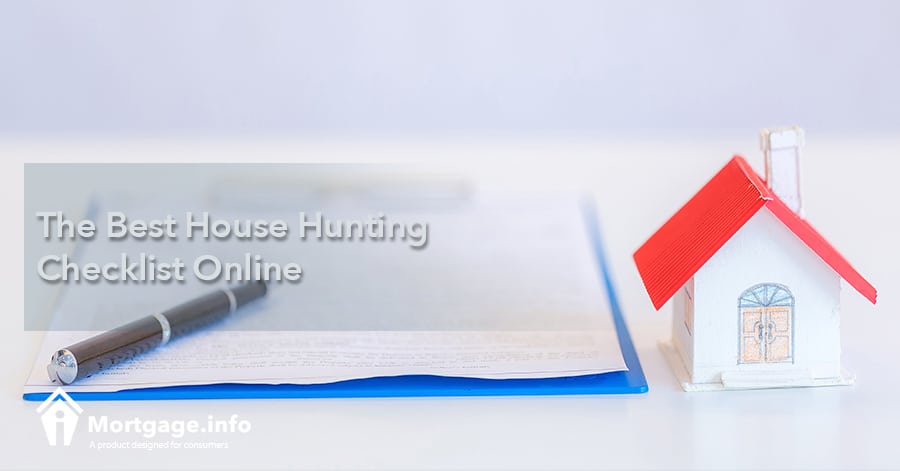Shopping for a house can be exciting and overwhelming at the same time. As you find things you love, you may also find things you hate. Don’t let your emotions get in the way. Buying a home is one of the largest investments in your life.
Looking for Current Mortgage Interest Rates? Click Here.
Use the following checklist to help you look objectively at potential homes for sale.
What Should you Look For in a Home?
First, you have things you must look for in a home. We can’t tell you what those are because it’s a personal preference. What do you need? What is non-negotiable for you? Put these items at the top of your checklist.
For example, if you have to have four bedrooms because you have three kids as well as you and your spouse, then that’s at the top of your list. If you require double ovens because you entertain a lot or you need a finished basement to give your mother-in-law a place to sleep, put that at the top of your list.
Think of all of the things you have to have to love your home. You want it to be somewhere you are comfortable and happy. Even if you only stay a short while, it will be at least a few years otherwise you would probably rent rather than buy.
The Interior Checklist
Once you know what you need/want in a home, it’s time to check the boxes on the checklist:
- Is the flooring intact? You don’t have to love the look of it, but is it in good condition? If you don’t have changing out flooring in your budget, make sure it’s at least livable, even if you don’t love the look.
- Are the ceilings and walls intact? Water stains, holes, and cracked drywall are all things you should notice. If you don’t plan to renovate the home, you want the ceilings and walls intact and able to last.
- Are the stairs safe and in good condition? Are there handrails? Are all of the stairs sturdy? Do they creak or crack as you walk on them?
- Are all systems in good, working order? Try out the systems yourself, but leave the technical stuff to the inspector. Make sure faucets run, heating/cooling work, and electricity is in good condition. If you notice any frayed wires or fire hazards, it’s a red flag.
- Are the doors in good condition? Do the doors open and close? Do they lock? Do they fit the doorway properly?
- Are the windows in good condition? Do the windows leak? Do they lock? Are they cracked? This affects the temperature, safety, and energy efficiency of your home.
- Are there enough rooms? Aside from bedrooms, what about the other rooms, is there enough of them? Did you want a living room and dining room? Do you want one great room?
- Are there appliances? Will they stay? What condition are they in?
- Are the window treatments staying? Some homeowners have an emotional attachment to their window treatments and take them with. Make sure you know what they plan to ensure that you are okay with it.
Looking for Current Mortgage Interest Rates? Click Here.
The Exterior Checklist
Now let’s look at the exterior of the home:
- Is the roof in good condition? This is another big area for the inspector, but you can tell at first glance if it’s in good or bad shape.
- Is the foundation in decent condition? Do you see large cracks or obvious pest infestation at the foundation?
- Is the siding in good condition? Does it look freshly painted or as if it needs a serious paint job? Is it falling apart or is it brand new?
- Are the garage and driveway in good condition? Is the garage big enough for your needs? Are the walls and concrete floor in good condition? What about the driveway? Is it cracked? Does it look well-maintained?
- What’s the curb appeal like? Do you love the landscaping or would you rip it all out and start over? This can be expensive, so choose wisely.
The Neighborhood Checklist
Remember, when you buy a home, you buy more than the home itself. You buy into a neighborhood. Check out the neighbors, their houses, and the environment. Is it loud? Did you drive by during different times of the day and on different days of the week?
Is the area near what you need? Think churches, schools, shopping, freeways, train stations, and anything else you do on a regular basis.
Ask about the cell phone and internet coverage. Can you get the services you prefer there or is it limited? This may affect your decision.
Is there a neighborhood association? What are the fees? Does the association have a habit of charging special assessments?
What are the taxes like? Has the area seen a lot of increases lately? Do a lot of people fight their taxes in the area?
When you shop for a home, make sure you look at all of the factors. Use the checklist above plus anything your realtor recommends. Using a licensed realtor can help you get to know an area even better. Rely on the professionals to help you make a decision as buying a home is a big investment. You want to make sure you do it right the first time.

